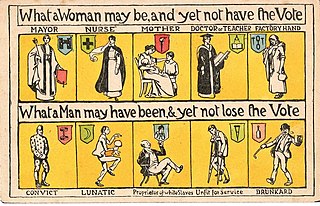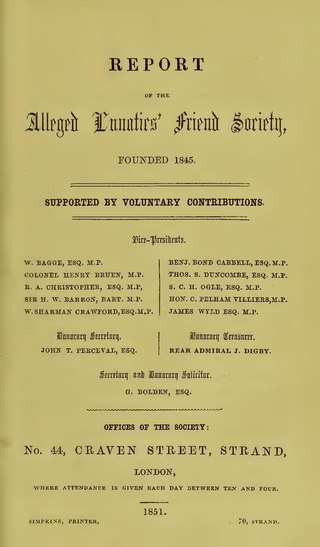
Lunatic is a term referring to a person who is seen as mentally ill, dangerous, foolish, or crazy—conditions once attributed to "lunacy". The word derives from lunaticus meaning "of the moon" or "moonstruck".

The Scottish Office was a department of the Government of the United Kingdom from 1885 until 1999, exercising a wide range of government functions in relation to Scotland under the control of the Secretary of State for Scotland. Following the establishment of the Scottish Parliament in 1999, most of its work was transferred to the newly established Scottish Executive, with a small residue of functions retained by the Scotland Office.

The Lunacy Act 1845 or the Lunatics Act 1845 and the County Asylums Act 1845 formed mental health law in England and Wales from 1845 to 1890. The Lunacy Act's most important provision was a change in the status of mentally ill people to patients.

The Mental Health Act 1983 is an Act of the Parliament of the United Kingdom. It covers the reception, care and treatment of mentally disordered people, the management of their property and other related matters, forming part of the mental health law for the people in England and Wales. In particular, it provides the legislation by which people diagnosed with a mental disorder can be detained in a hospital or police custody and have their disorder assessed or treated against their wishes, informally known as "sectioning". Its use is reviewed and regulated by the Care Quality Commission. The Act was significantly amended by the Mental Health Act 2007. A white paper proposing changes to the act was published in 2021 following an independent review of the act by Simon Wessely.
Lunacy Act is a stock short title used in the United Kingdom for legislation relating to mental illness.
The Commissioners in Lunacy or Lunacy Commission were a public body established by the Lunacy Act 1845 to oversee asylums and the welfare of mentally ill people in England and Wales. It succeeded the Metropolitan Commissioners in Lunacy.

The Alleged Lunatics' Friend Society was an advocacy group started by former asylum patients and their supporters in 19th-century Britain. The Society campaigned for greater protection against wrongful confinement or cruel and improper treatment, and for reform of the lunacy laws. The Society is recognised today as a pioneer of the psychiatric survivors movement.

The Madhouses Act 1774 was an Act of the Parliament of Great Britain, which set out a legal framework for regulating "madhouses".

The lunatic asylum, insane asylum or mental asylum was an early precursor of the modern psychiatric hospital.

Sir Arthur Mitchell MD LLD was a Scottish doctor involved in the study and care of patients with mental illness. He served on several public commissions, and wrote widely on history and anthropology.

St. Brendan's Hospital was a psychiatric facility located in the north Dublin suburb of Grangegorman. It formed part of the mental health services of Dublin North East with its catchment area being North West Dublin. It is now the site of a modern mental health facility known as the "Phoenix Care Centre". Since the official opening of the Richmond Lunatic Asylum in 1815 the Grangegorman site has continuously provided institutional facilities for the reception of the mentally ill until the present day. As such the Phoenix Care Centre represents the continuation of the oldest public psychiatric facility in Ireland.
The following outline is provided as an overview of and topical guide to psychiatry:
This disability rights timeline lists events outside the United States relating to the civil rights of people with disabilities, including court decisions, the passage of legislation, activists' actions, significant abuses of people with disabilities, and the founding of various organizations. Although the disability rights movement itself began in the 1960s, advocacy for the rights of people with disabilities started much earlier and continues to the present.

The Mental Deficiency Act 1913 was an act of Parliament of the United Kingdom creating provisions for the institutional treatment of people deemed to be "feeble-minded" and "moral defectives". "It proposed an institutional separation so that mental defectives should be taken out of Poor Law institutions and prisons into newly established colonies."

The Old Manor Hospital was a psychiatric hospital in Salisbury, Wiltshire, England. It was established in the early 19th century as a private licensed house called Fisherton House or Fisherton House Asylum, which became the largest private madhouse in the United Kingdom. In 1924, following a change of proprietors, it was renamed Old Manor Hospital and in 1955 it was amalgamated into the National Health Service. From 1813 to 1955 it was owned and managed by members of the same family. The Old Manor Hospital closed in 2003 and was replaced by Fountain Way, a smaller, modern, psychiatric hospital on part of the same site. In 2014 the site was acquired by Quantum Group for development as a residential estate and the conversion of the main building to a hotel.
Sir James Coxe MD FRSE was a Scottish physician and expert on psychiatry. Controversially he linked mental illness with a distancing from religion and with a parallel deterioration of the body. Rather more productively, he was an early campaigner against restraint in asylums, and he advocated greater training of women in the field of medicine.
Mental health in the United Kingdom involves state, private and community sector intervention in mental health issues. One of the first countries to build asylums, the United Kingdom was also one of the first countries to turn away from them as the primary mode of treatment for the mentally ill. The 1960s onwards saw a shift towards Care in the Community, which is a form of deinstitutionalisation. The majority of mental health care is now provided by the National Health Service (NHS), assisted by the private and the voluntary sectors.
The Commissioners in Lunacy for Scotland or Lunacy Commission for Scotland were a public body established by the Lunacy (Scotland) Act 1857 to oversee asylums and the welfare of mentally ill people in Scotland.

The Lunacy (Ireland) Act 1821 formed the basis of mental health law in Ireland from 1821 until 2015.











